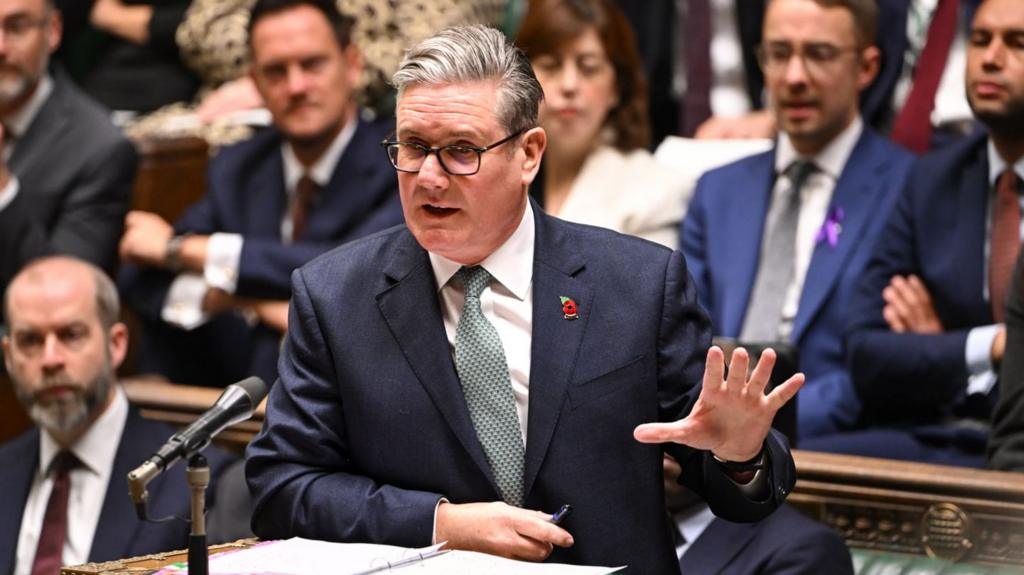“`html
Sir Keir Starmer has asserted that he has “never authorised” any attacks on his cabinet ministers, deeming such briefings against them as “unacceptable.”
The Prime Minister addressed the issue during Prime Minister’s Questions following reports that some of his allies had suggested to multiple media outlets that he could face a leadership challenge from a cabinet member, potentially including Health Secretary Wes Streeting.
Speculation has arisen regarding the extent of Sir Keir’s awareness of these anonymous briefings, which were purportedly aimed at bolstering his position, and whether he had in any way encouraged them.
Mr. Streeting has denied any plans for a leadership bid and has called for the dismissal of those responsible for the briefings.
When questioned at an NHS conference in Manchester about whether he would support Sir Keir if there were plots to remove him as Prime Minister, Mr. Streeting affirmed, “Yes.”
He added, “The bizarre aspect of some overnight juvenile briefing is that it’s individuals within No. 10 who have suggested the Prime Minister is fighting for his job.”
“I don’t believe that’s a helpful or constructive statement, and I also don’t believe it’s accurate,” he stated.
While Mr. Streeting has criticized the “toxic culture” within No. 10, he has stated that he does not believe the Prime Minister is behind the briefings.
When asked if he believed Sir Keir’s chief of staff, Morgan McSweeney, was responsible for the culture in Downing Street, he responded, “I am not going to contribute to the toxic culture by engaging in it and targeting individuals.”
“I don’t believe that is a constructive or positive approach.”
“One thing I would say in defense of Morgan McSweeney is that a Labour government would not exist without him.”
During PMQs, Conservative leader Kemi Badenoch stated that the Prime Minister had “lost control of his government… and lost the trust of the British people.”
She asserted that Mr. McSweeney was responsible for the culture in No. 10 and inquired whether the Prime Minister still had confidence in him.
Sir Keir responded, “Morgan McSweeney, my team, and I are entirely focused on delivering for the country.”
“Let me be clear, I have, of course, never authorized attacks on cabinet members. I appointed them to their posts because they are the best individuals to carry out their duties.”
Sir Keir informed MPs that “any attack on any member of my cabinet is completely unacceptable.”
He stated that Mr. Streeting, who was absent from PMQs to deliver a speech at the NHS conference, was doing a “great job” by reducing waiting lists and increasing the number of doctors.
Following PMQs, the Prime Minister’s press secretary informed reporters that the briefings against Mr. Streeting originated “from outside No. 10” and that the Prime Minister had complete confidence in Mr. McSweeney.
The spokesperson declined to comment on whether a leak inquiry was underway, but affirmed that leaks would be “dealt with.”
Briefings of this nature are a common element of political reporting in Westminster, where individuals speak to journalists “off the record.”
This entails sharing information that they are not prepared to disclose on camera, which the BBC reports to provide a comprehensive account of the situation.
On Tuesday evening, supporters of the Prime Minister informed journalists that he would contest any challenge to his leadership, which they believed could materialize as early as after the Budget on November 26.
They argued that removing the Prime Minister could create instability, disrupt international markets, and damage the relationship he has cultivated with US President Donald Trump.
Labour MPs are reportedly considering Home Secretary Shabana Mahmood as a potential candidate to replace Sir Keir. Speculation also suggests that Energy Secretary Ed Miliband could be a contender.
Despite securing a landslide majority in the July 2024 general election, Sir Keir’s tenure in Downing Street has been turbulent, and opinion polls indicate his unpopularity.
The Budget in two weeks, along with elections in Scotland and Wales and local elections in England next year, represent critical junctures for the government.
Supporters of the Prime Minister have argued that a leadership contest would plunge the party into the chaos reminiscent of the final years of the previous Conservative administration.
To trigger a leadership contest against the Prime Minister, challengers would require the support of 20% of Labour MPs, which currently translates to 81 nominations.
Several Labour MPs and ministers have publicly and privately condemned the briefings.
During an appearance on BBC Politics Live, Business Minister Sir Chris Bryant described them as “plain daft.”
Jo White, Labour MP for Bassetlaw, stated, “This is a group of individuals who believe they are more intelligent than the rest of us, who dedicate their time to selectively briefing journalists and stirring the pot.”
“I simply want to say: we are not having it.”
However, some Labour MPs who typically support the Prime Minister characterized the timing and content of the briefing as “badly handled” and “baffling.”
One senior Labour figure questioned why Sir Keir’s allies had “legitimized what was a taboo” by publicly acknowledging the possibility of a leadership challenge.
Sarah Taylor asserts that there is “no vision for the Labour Party that’s being truly explained.”
Sources tell the BBC that the Prime Minister’s top aide was not involved “directly or indirectly” in briefings against cabinet ministers.
The stars are signing a letter asking the government to take action after promising to cap resale prices.
The prime minister has apologised for signing off the appointment of a Labour donor to the watchdog role.
The Prime Minister is “incandescent” at way all of this has played out, writes BBC’s political editor.
“`

